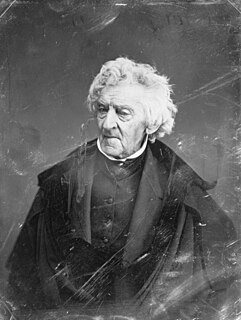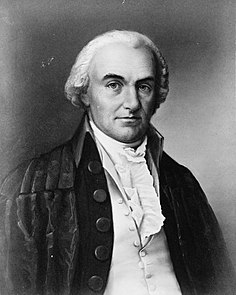Related Research Articles

Ex parte Merryman, 17 F. Cas. 144 (No. 9487), is a well-known and controversial U.S. federal court case that arose out of the American Civil War. It was a test of the authority of the President to suspend "the privilege of the writ of habeas corpus" under the Constitution's Suspension Clause, when Congress was in recess and therefore unavailable to do so itself. More generally, the case raised questions about the ability of the executive branch to decline enforcement of orders from the judicial branch when the executive believes them to be erroneous and harmful to its own legal powers.

The United States District Court for the District of Rhode Island is the Federal district court whose jurisdiction is the state of Rhode Island. The District Court was created in 1790 when Rhode Island ratified the Constitution. The Federal Courthouse was built in 1908.

William Cranch was an American attorney and judge. He was notable for his role as the second reporter of decisions of the Supreme Court of the United States and his long tenure as a judge on the United States Circuit Court of the District of Columbia.
The writ of coram nobis is a legal order allowing a court to correct its original judgment upon discovery of a fundamental error that did not appear in the records of the original judgment's proceedings and would have prevented the judgment from being pronounced. The term "coram nobis" is Latin for "before us" and the meaning of its full form, quae coram nobis resident, is "which [things] remain in our presence". The writ of coram nobis originated in the English court of common law in the English legal system during the sixteenth century.
The Midnight Judges Act represented an effort to solve an issue in the U.S. Supreme Court during the early 19th century. There was concern, beginning in 1789, about the system that required the Justices of the Supreme Court to "ride circuit" and reiterate decisions made in the appellate level courts. The Supreme Court Justices had often voiced concern and suggested that the judges of the Supreme and circuit courts be divided. President Thomas Jefferson did not want the judiciary to gain more power over the executive branch.
Extradition law in the United States is the formal process by which a fugitive found in the United States is surrendered to another country or state for trial, punishment, or rehabilitation. For foreign countries, the process is regulated by treaty and conducted between the federal government of the United States and the government of a foreign country. The process is considerably different from interstate or intrastate extradition. Florida, Alaska, and Hawaii do not extradite for a misdemeanor conviction that was convicted in the US, as of 2010. Some felonies are an exception in American law such as a crime that is violent in nature, or a sexual offense, or felony driving while intoxicated; they will entail extradition from all states in the United States. Theft charges and small drug crimes are the exception; for instance, if a minor crime is committed in Florida, a person apprehended in Idaho will not be extradited back to the original crime's jurisdiction. Federal charges are governed by US federal law and most states, with the exceptions of South Carolina and Missouri, have adopted the Uniform Criminal Extradition Act. In practice, Florida, Alaska, and Hawaii typically do not extradite if the crime in question is not a felony because of the associated costs of transporting the suspect and the housing fees that must be paid to the jurisdiction in which the accused is held until transported.

The Habeas Corpus Suspension, 12 Stat. 755 (1863), entitled An Act relating to Habeas Corpus, and regulating Judicial Proceedings in Certain Cases, was an Act of Congress that authorized the president of the United States to suspend the of the writ of habeas corpus in response to the American Civil War and provided for the release of political prisoners. It began in the House of Representatives as an indemnity bill, introduced on December 5, 1862, releasing the president and his subordinates from any liability for having suspended habeas corpus without congressional approval. The Senate amended the House's bill, and the compromise reported out of the conference committee altered it to qualify the indemnity and to suspend habeas corpus on Congress's own authority. Abraham Lincoln signed the bill into law on March 3, 1863, and suspended habeas corpus under the authority it granted him six months later. The suspension was partially lifted with the issuance of Proclamation 148 by Andrew Johnson, and the Act became inoperative with the end of the Civil War. The exceptions to his Proclamation 148 were the States of Virginia, Kentucky, Tennessee, North Carolina, South Carolina, Georgia, Florida, Alabama, Mississippi, Louisiana, Arkansas, and Texas, the District of Columbia, and the Territories of New Mexico and Arizona.
United States v. More, 7 U.S. 159 (1805), was a United States Supreme Court case in which the Court held that it had no jurisdiction to hear appeals from criminal cases in the circuit courts by writs of error. Relying on the Exceptions Clause, More held that Congress's enumerated grants of appellate jurisdiction to the Court operated as an exercise of Congress's power to eliminate all other forms of appellate jurisdiction.

The Taney Court heard thirty criminal law cases, approximately one per year. Notable cases include Prigg v. Pennsylvania (1842), United States v. Rogers (1846), Ableman v. Booth (1858), Ex parte Vallandigham (1861), and United States v. Jackalow (1862).
Riding circuit was one of the responsibilities of U.S. Supreme Court justices during the Marshall Court (1801–1835). Under the Judiciary Act of 1801, the United States federal judicial districts were divided into six United States circuit courts—one for each justice. Rather than appointing separate circuit judges, the circuit courts were staffed by a combination of the resident United States district court judges from that district and the Supreme Court justice assigned to that circuit.

The Chase Court (1864–1873) issued thirty-five opinions in criminal cases over nine years, at a significantly higher rate than the Marshall Court or Taney Court before it. Notable such cases include Ex parte Milligan (1866), Pervear v. Massachusetts (1866), Ex parte McCardle, Ex parte Yerger (1868), and United States v. Kirby (1868).

During the tenure of Morrison Waite as Chief Justice of the Supreme Court of the United States, the Supreme Court heard an unprecedented volume and frequency of criminal cases. In just fourteen years, the Court heard 106 criminal cases, almost as many cases as the Supreme Court had heard in the period from its creation to the appointment of Waite as Chief Justice. Notable cases include United States v. Cruikshank (1875), United States v. Reese (1875), Reynolds v. United States (1878), Wilkerson v. Utah (1879), the Trade-Mark Cases (1879), Strauder v. West Virginia (1880), Pace v. Alabama (1883), United States v. Harris (1883), Ex parte Crow Dog (1883), Hurtado v. California (1884), Clawson v. United States (1885), Yick Wo v. Hopkins (1886), United States v. Kagama (1886), Ker v. Illinois (1886), and Mugler v. Kansas (1887).

The Crimes Act of 1790, formally titled An Act for the Punishment of Certain Crimes Against the United States, defined some of the first federal crimes in the United States and expanded on the criminal procedure provisions of the Judiciary Act of 1789. The Crimes Act was a "comprehensive statute defining an impressive variety of federal crimes."

The Crimes Act of 1825, formally titled An Act more effectually to provide for the punishment of certain crimes against the United States, and for other purposes, was the first piece of omnibus federal criminal legislation since the Crimes Act of 1790. In general, the 1825 act provided more punishment than the 1790 act. The maximum authorized sentence of imprisonment was increased from 7 to 10 years; the maximum fine from $5,000 to $10,000. But, the punishments of stripes and pillory were not provided for.

A certificate of division was a source of appellate jurisdiction from the circuit courts to the Supreme Court of the United States from 1802 to 1911. Created by the Judiciary Act of 1802, the certification procedure was available only where the circuit court sat with a full panel of two: both the resident district judge and the circuit-riding Supreme Court justice. As Chief Justice John Marshall wrote, he did not have "the privilege of dividing the court when alone."
United States v. Morgan, 346 U.S. 502 (1954), is a landmark decision by the United States Supreme Court which provides the writ of coram nobis as the proper application to request federal post-conviction judicial review for those who have completed the conviction's incarceration.
References
- Dwight Henderson, Congress, Courts, and Criminals: The Development of Federal Criminal Law, 1801–1829 (1985).
